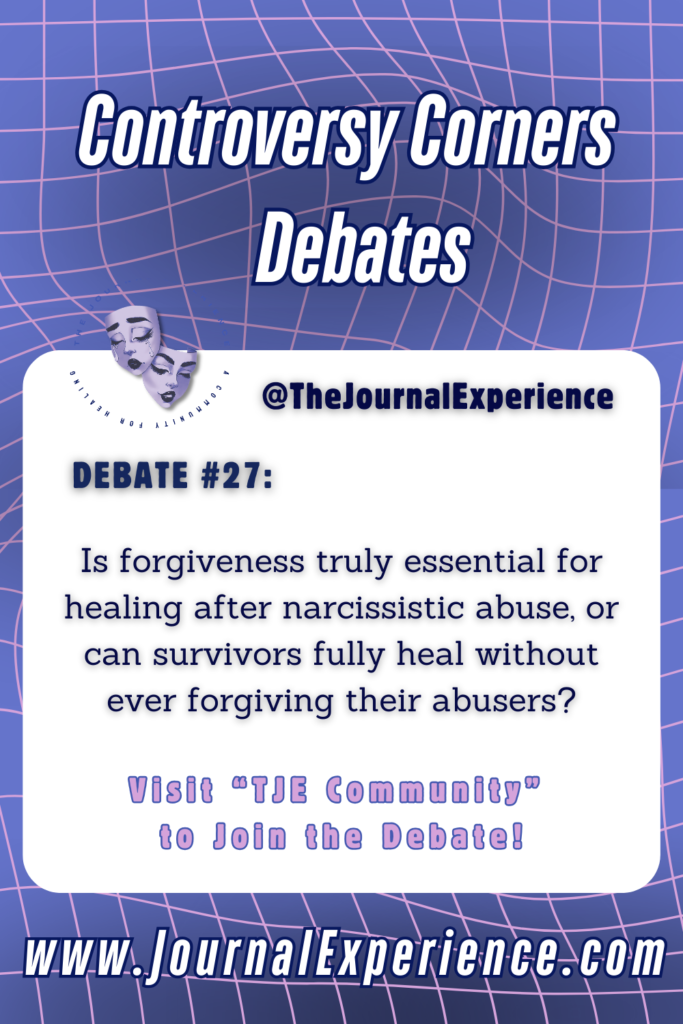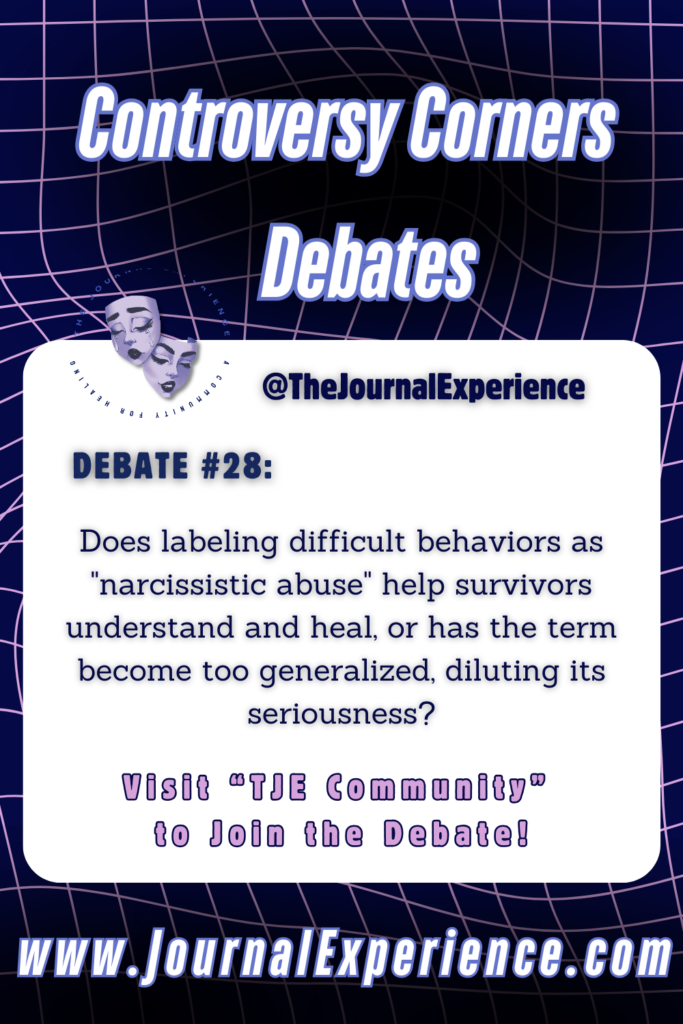Narcissistic abuse is a deeply disorienting experience. It often leaves survivors questioning their reality, doubting their emotions, and feeling a profound sense of isolation. Unlike physical wounds, the damage from narcissistic abuse hides in plain sight—woven into the way survivors speak to themselves, second-guess their intuition, or suppress their needs in favor of keeping the peace.

Many survivors report feeling confused, invalidated, and emotionally paralyzed long after the relationship ends. This kind of psychological abuse can make even the most resilient person feel powerless. That’s why healing from narcissistic abuse requires intentional care, safe reflection, and tools that help survivors reconnect with their truth.
Journaling is one of the most grounding practices available. It allows survivors to name the harm, rewrite their story, and begin rebuilding emotional clarity from within. These 50 journal prompts are specifically designed to support emotional recovery on a daily basis. Doesn’t matter if you’re still in the relationship, freshly separated, or rebuilding your life years later, these prompts will help guide you toward validation, empowerment, and inner peace.
Guided Journal Prompts for Healing from Narcissistic Abuse
Self-Help Writing Prompts for Daily Healing
Daily writing can help you reconnect with your voice and affirm what you know to be true. These prompts are designed to help you validate your own experience, release lingering doubt, and process through the emotional confusion that narcissistic abuse often causes. You deserve to have your story honored and your healing supported.
When your reality has been distorted for so long, journaling can become a vital lifeline to clarity. It gives you the power to name what happened, reflect on what you felt, and reclaim the truth that was once buried under manipulation. These moments of reflection aren’t about perfection—they’re about showing up for yourself with honesty and compassion.
Journal Prompts
- What emotion is most present for me today, and why?
- What part of my story do I still feel unsure about?
- What do I wish someone had told me while I was still in the relationship?
- What does emotional safety look and feel like to me?
- When did I begin to lose trust in myself, and what contributed to it?
- What am I ready to stop apologizing for?
- How can I gently affirm my experiences today?
- What would it feel like to trust my intuition again?
- What does self-validation mean to me?
- What is one thing I’m proud of myself for surviving?
Clarity Reminder
You do not need anyone else to confirm what you went through. Your pain is valid, and your healing is real.

Exploring the Nature of Narcissistic Abuse
Understanding the dynamics of narcissistic abuse can help you detach from self-blame. Survivors often spend years thinking they were the problem, only to later realize they were manipulated into silence and self-doubt. This section helps you explore what happened with honesty, while separating your identity from their projections, manipulation, and emotional control. Naming these patterns gives you a language for the pain you endured—and a mirror to finally see your experience clearly. Writing about these experiences helps bring clarity where there was once only confusion.
Journal Prompts
- What patterns did I notice in how they treated me over time?
- What manipulative behaviors did I normalize to survive?
- How did the cycle of idealization and devaluation show up in our relationship?
- What tactics were used to silence or dismiss me?
- What did they project onto me that was never mine to carry?
- How did they twist my words or rewrite the truth?
- What false beliefs about myself did I start to internalize?
- What did love feel like in the beginning, and how did it change?
- What moments felt emotionally unsafe but were downplayed?
- What were the red flags I can now recognize with clarity?
Insight Exercise
List five things you know now that you didn’t know then—and how they protect your peace moving forward.
Therapeutic Writing Techniques for Recovery
Therapeutic journaling isn’t about reliving trauma—it’s about reclaiming power. These exercises invite deeper emotional release through visualizations, compassionate letters, and self-reflective practices that help restore trust within. Use these tools gently and give yourself time to process what comes up.
Journal Prompts
- Write a letter to your past self during the relationship. What would you say to comfort and protect them?
- Write a letter to your inner child. What do they need to hear from you right now?
- Describe a version of yourself that feels safe, strong, and self-assured.
- Imagine cutting the cord emotionally from the person who hurt you—what does that look and feel like?
- What would it feel like to be emotionally detached from their approval?
- Mirror journaling: Look in the mirror and describe what you see with compassion.
- What are you still grieving, and how can you honor that grief without shame?
- What story do you want to tell about this chapter in your life?
- What parts of yourself are slowly coming back online?
- Write your own closure—what final words bring you peace?
Healing Visualization
Close your eyes and picture yourself surrounded by light. You are safe, whole, and worthy. Now write about what that version of you would say.

Rebuilding Mental Health and Trust in Yourself
Recovery is not just about looking back—it’s about moving forward with intention. These final prompts focus on reclaiming self-trust, cultivating emotional safety, and giving yourself permission to build a future that reflects your healing, not your trauma.
Journal Prompts
- What does it mean to trust myself again?
- What areas of my life already feel more peaceful without them?
- What boundaries am I learning to honor in my everyday life?
- What does solitude feel like when it’s safe and self-affirming?
- What makes me feel grounded, calm, and connected to myself?
- What are three things I can do this week to nourish my mental health?
- How has my definition of love changed?
- What are the most meaningful lessons I’ve learned so far?
- How do I want to show up in future relationships?
- What version of myself am I excited to meet again?
- What helps me feel emotionally safe on hard days?
- What small victories have I had this month?
- What parts of me am I ready to reclaim?
- What is one belief I now choose to live by?
- What daily affirmations support my recovery?
- Who am I without the weight of their voice in my head?
- How am I already more whole than I thought?
- What does inner peace look like for me today?
- What is no longer mine to carry?
- What kind of life am I committed to building now?
Empowerment Reminder
You are not broken. You are rebuilding. Every word you write is part of your return to self.
Overview
Journaling is a reclamation of your voice, your clarity, and your healing. With every prompt, you take your power back. With every sentence, you remind yourself that your story didn’t end in abuse—it transformed in recovery.
You deserve to live free of confusion, fear, and emotional chaos. These 50 prompts are not about rehashing the past—they’re about helping you build a future grounded in emotional safety, self-trust, and true peace. Keep writing. Keep healing. Keep choosing you.

Inside The Journal Experience Community, you’ll find a vault of healing tools, journal collections, and guided prompts designed specifically for those breaking free from narcissistic abuse. Become a member and receive access to our survivor-centered newsletter, emotional support resources, and daily writing encouragement to guide your journey.
Subscribe today to our newsletter and take one small, meaningful step closer to clarity, peace, and the self you never lost—only forgot.